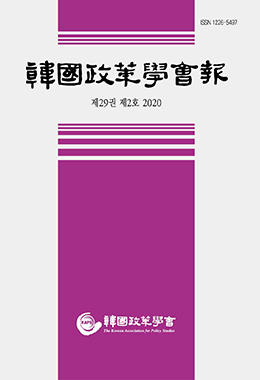‘학습’은 정책변동의 주요 원인으로 지목되었다. 그러나 정책학습 선행연구에 따르면, 개념의 조작화와 학습 과정을 모형화하기 위한 시도는 엄밀하지 못하였다고 지적하였다. Birkland(2006)의 ‘사건 관련 정책학습(Event-Related Policy Learning Model: ERPL) 모형’ 역시 초점사건 판단의 자의성과 변수들의 조작화의 미비를 지적받아 왔다. 따라서 본 연구에서는 정책실패와 탈제도화 개념, 그리고 ERPL모형에 대한 재검토를 통해 해당 모형의 한계점을 극복할 가능성을 탐구하였다.
‘가습기살균제 사건’은 전례 없는 화학물질 참사이며 피해 강도와 규모의 심각성이 밝혀졌으므로 ERPL모형의 적용사례로 선정하였다. 관련 문헌과 국회 의안정보시스템의 자료를 증거로 수집하였고, 연구질문 해결을 위해 연구설계가 수정되었다. 연구 분석결과, 사회재난인 가습기살균제 사건은 ‘재구성’에 의해 ERPL의 ‘사건’으로 정의되었고, 의제설정과 의사결정 실패가 발생하였다. 이를 통해 초점사건에 ‘탈제도화’를 일으키는 정책실패를 포함하고, 이항변수로 설정된 후속 단계에 중간항을 두어야 모형 내에서 비선형성까지 고려할 수 있다는 결론을 도출하였다.
May(1992)의 3가지 학습이 모두 발생하였고, 정치적 학습은 두 정책학습과 음(-)의 상관관계에 있었다. 정책학습의 두 유형은 양(+)의 상관관계에 있었다. 시기적으로 정치적 학습이 수단적 및 사회적 학습에 선행하는 시차성을 확인하였다. 모형을 정교화할 수 있는 지점들을 제시하였고, 재난 이후 장기 복구의 복잡성을 고려한 정책적 제언을 제시하였다.
Learning has been pointed to as the key cause of changes in policies. The preceding studies on policy learning showed, however, that not enough attempts had been made for “modeling.” The Event-related Policy Learning Model (ERPL) by Birkland (2006), who attempted to model policy learning, has also been criticized for its arbitrary determination of the focus event and for its non-operationalization of the variables. For this reason, this study attempted to supplement the limitations of the relevant models by reviewing the concept of policy failure/deinstitutionalization and the ERPL model. Especially to confirm the relationships among the types of policy learning, the results of a wide range of studies on policy learning were used as the bases for the design of this study.
The process of enactment of the Special Act on Humidifier Disinfectants was selected for this study, and the related documents and the data in the computerized bill system of the National Assembly were used as evidences. The results of the analysis showed that the tragic incident concerning the humidifier disinfectant was a “major policy failure,” as clearly manifested by abundant evidences. In addition, it was confirmed that the initial policy change did not happen properly. The group mobilization related to the incident, however, was more profound in the 20th National Assembly. In this process, it was discovered that among the different types of variable operationalization, “group mobilization” needs more indicators for its evaluation, so that instead of just assessing if there was mobilization, there should be intermediate-term mobilization (limited mobilization).
In the example herein, all the three types of policy learning (political policy learning, instrumental policy learning, and social policy learning) took place, and political policy learning showed negative correlations with instrumental and social policy learning while the two latter types of policy learning had a positive correlation with each other. Also, a time difference was discovered, where political policy learning preceded instrumental and social policy learning.
It is believed that this study can make a practical contribution to identifying the policy intervention needed for desirable policy learning after a policy failure, through a theoretical contribution to the empirical refinement of the ERPL model.


